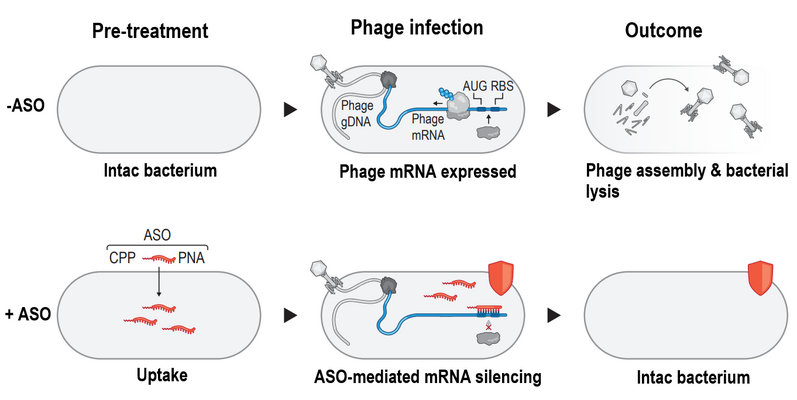
Technology Transfer
Here, we present a selection of technologies based on the expertise, discoveries, and patents of the Helmholtz Institute Würzburg (HIRI).
ASO-Based mRNA SilencingMultiplexed RNA detection (LEOPARD)Guide RNA targeting efficiency prediction
Humanity faces enormous challenges due to increasing antibiotic resistance, emerging pathogens and chronic infections. To effectively combat these threats, it is essential to rapidly translate scientific discoveries into innovative diagnostic and therapeutic approaches.
Researchers at the Helmholtz Institute Würzburg (HIRI) study the role of ribonucleic acid (RNA) in infection processes and develop new RNA-based strategies to fight pathogens. Through strategic collaborations and patents, we enable the implementation of our research into practical solutions—bridging groundbreaking basic research with real-world applications.
ASO-Based mRNA Silencing for Phage-Host Interaction Research
Bacteriophages, viruses that attack bacteria, exhibit enormous genetic as well as phenotypic diversity—and hold great potential for biotechnological and medical applications. However, exploiting this potential requires the functional characterization of essential genes. This technology offers a method for silencing messenger RNA in phages by using antisense oligomers (ASOs), allowing the mapping of genes in both DNA and RNA phages. The non-genetic approach could be useful in industrial applications where fermentation processes need to be protected from phage contamination or in optimizing phage therapy.
Inventors
- • Jörg Vogel, HIRI director
- • Milan Gerovac, former HIRI postdoc and now HZI group leader
Commercial Opportunity
- • Phage therapy
- • Biotechnology research
- • Pharmaceutical applications
- • Available for in-licensing and co-development
- • Industrial processes
Development Status
- • Experimental validation stage, with successful proof-of-concept studies
- • Further developments required to optimize ASO delivery
Patent Situation
- European patent application filed in July 2024
Multiplexed RNA detection with reprogrammed tracrRNAs (LEOPARD)
Most conventional molecular diagnostics, like PCR tests, usually detect only a single disease-related biomarker. In contrast, the CRISPR-based diagnostic platform LEOPARD is highly multiplexable, with the potential to detect a variety of disease-related biomarkers in just one test. By allowing rapid point-of-care testing, LEOPARD is particularly suitable for use outside the clinical environment.
Inventors
- • Chase Beisel, HIRI department head
- • Chunlei Jiao, former HIRI PhD student / postdoc and now assistant professor at the National University of Singapore
- • Cynthia Sharma, professor at the University of Würzburg (JMU)
- • Gaurav Dugar, former JMU PhD student and now assistant professor at the University of Amsterdam
Development Status
- Current efforts focus on the development of a multiplexed detection systems based on microarrays and lateral flow strips
Patent Situation
- • European patent application filed in February 2020
- • International PCT-application pending
Prediction for guide RNA targeting efficiency for gene of interest
CRISPR interference (CRISPRi), which involves targeting a catalytically inactive Cas protein to block transcription, is the leading technique for gene silencing in bacteria. However, CRISPRi design rules remain insufficiently defined, making it challenging to develop effective tools. This technology provides a predictive algorithm for guide RNA design, improving silencing efficiency while reducing experimental screening costs.
Inventors
- • Lars Barquist, HIRI-associated scientist
- • Yanying Yu, former HIRI PhD student
Commercial Opportunity
- Offered for licensing
Development Status
- • Software implementation for any bacterium with a genome wide CRISPRi screen
- • Model to predict the guide efficiency of dCas9 implemented in E. coli, including webserver
- • Command-line tool available
Patent Situation
- • Priority application filed in July 2020
- • International (PCT-)application published in 2022
- • European patent application granted in August 2024
- • National/regional applications pending in US
More about our Research
Research foci
Research Groups
Publications
Würzburg RNA Ecosystem
SARS-CoV-2 Research



